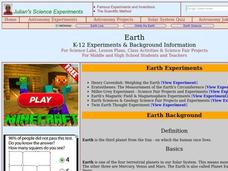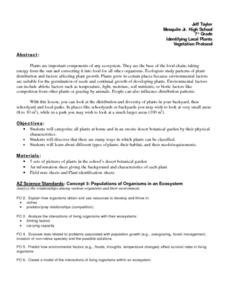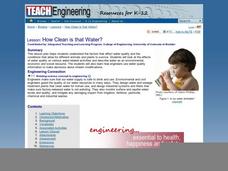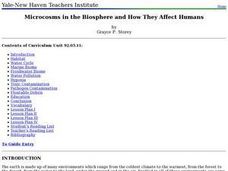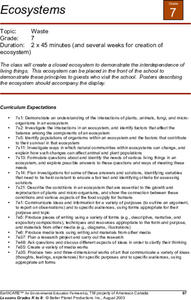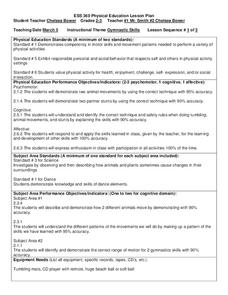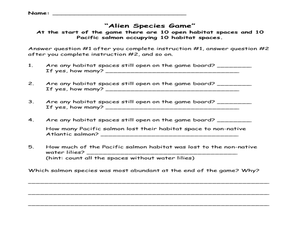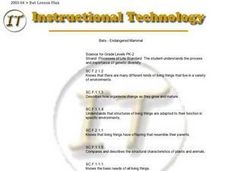Curated OER
Collecting Compost
Students observe a composting box. In this soil activity, students create a composting bin by using a bin, newspaper, worms, and food scraps. Students create a composting food web.
Curated OER
Temperate Forests vs. Wetlands
Students compare and contrast the temperate forest and wetlands by researching them in groups. In this forest lesson plan, students identify the economic, ecological, and social benefits of each.
Curated OER
The Changing Coral Reef Community Game
Students examine organisms that inhabit the coral reefs and their living requirements. In this coral reef lesson plan students chart population changes and play a game.
Curated OER
Build an Ice Cap
Students research Earth science by conducting an experiment in class. In this ice-cap lesson, students identify what an ice cap is and create a biome using a box which measures 1 ft. x 1 ft. Students participate in an animal role-playing...
Curated OER
Earth
Students study the earth in relation to the solar system. For this planetary lesson students complete several investigations into the measurement of the earth and its magnetic field.
Curated OER
U.S. History: Antebellum Heroes and Villains
Eighth graders research and write reports on key figures of the Antebellum Period. The projects also include pictures, bibliographies, and timelines about their assigned figure. In addition, 8th graders present oral reports to classmates.
Curated OER
How Clean is the Water?
Students read about and discuss water and how it is used as a resource and how engineers use technology to preserve it. In this water lesson plan, students look at a picture of water treatment and tell what is wrong with the picture.
Curated OER
Science: Microcosms in the Biosphere
In a series of lessons, examine the impact on humans by microcosms in the biosphere. Among the plans structured for students with different abilities and learning styles, are activities describing the symbiotic relationship, drawing the...
Curated OER
Plant Structure and Growth
This plant structure and function PowerPoint addresses the main organs and the factors that affect its development as well as going into detail about the specializations at a cellular level. The cell functions and system...
Curated OER
Web of Life - Role-Playing
Students role-play how organisms adapt to their environment. They play 20 questions with plant and animal habitats. They create a web of life to demonstrate how each plant and animal relies on the other for survival.
Curated OER
The Dirt on Worms!
Fourth graders make predictions, observe, collect and record data. They investigate several soil and worm websites. Finally, 4th graders write a letter to The President which defends earthworms by explaining their value to the United...
Curated OER
1st Grade - Act. 22: Retelling the Tiny Seed
First graders write sentences and illustrate ways seeds travel.
Curated OER
Soil Permeability
Young scholars discuss how soil permeability is affected by permafrost. In this soil lesson plan, students freeze soil over night, and discuss how the environmental conditions of freezing affect soil and further affect vegetation.
Curated OER
Ecosystems
Seventh graders create a closed ecosystem and place it where is it visible to others in the school. They label it with posters describing the interdependence of living things in the ecosystem. They discuss what might happen to the...
Curated OER
Sun, Sand, and Hippos
Young scholars conduct research on varied aspects of hippopotamuses and in doing so, synthesize and evaluate a variety of information sources.They summarize content knowledge from varied resources and apply this knowledge by creating a...
Michigan Sea Grant
Food Chains and Webs
Starting with a simple food chain, young scientists interpret the difference and interrelatedness between herbivores, carnivores and producers. They answer questions related to cause and effect of food chain disruptions, including the...
Curated OER
Endangered!
Young scholars research endangered species. In this ecology and literacy research lesson, students work with a partner to research an endangered species of their choice. Young scholars choose from a variety of presentation methods...
Curated OER
Corn and Tortillas
For this reading comprehension worksheet, students read a 1-page selection regarding corn and then respond to 7 matching questions regarding foods made with corn. Students then respond to 7 matching questions involving Spanish words. A...
Curated OER
Native Species Restoration and its Impact on Local Populations
Students explore how predators help control the growth of prey species for a more balanced ecosystem.
Curated OER
Mammals: Mammals and Their Ways
Students study the difference between innate and learned behaviors. They observe the adaptations and behaviors of mammals in this series of lessons.
Curated OER
Gymnastic Skills
Students compete in a variety of games. In this gymnastic skills instructional activity, students play tag, participate in a challenge course, and practice gymnastics moves to increase physical fitness.
Curated OER
Salmon and the Non-Native Species
Students investigate the affect of non-native species on Pacific Salmon. In this non-native species and Pacific Salmon lesson, students participate in a competition and habitat loss game. They play the game in groups, while answering...
Curated OER
Bats - Endangered Mammal
Students complete question sheet on Bats and research information using a list of websites provided by the teacher. They work with peers to complete a scavenger hunt worksheet about bats.
Curated OER
Making a Food Web and Learning About Ecosystems
Third graders examine the difference between a food web and food chain. They also examine the importance of the sun in a food web and food chain. Students understand what happens when you remove parts of the chain.






